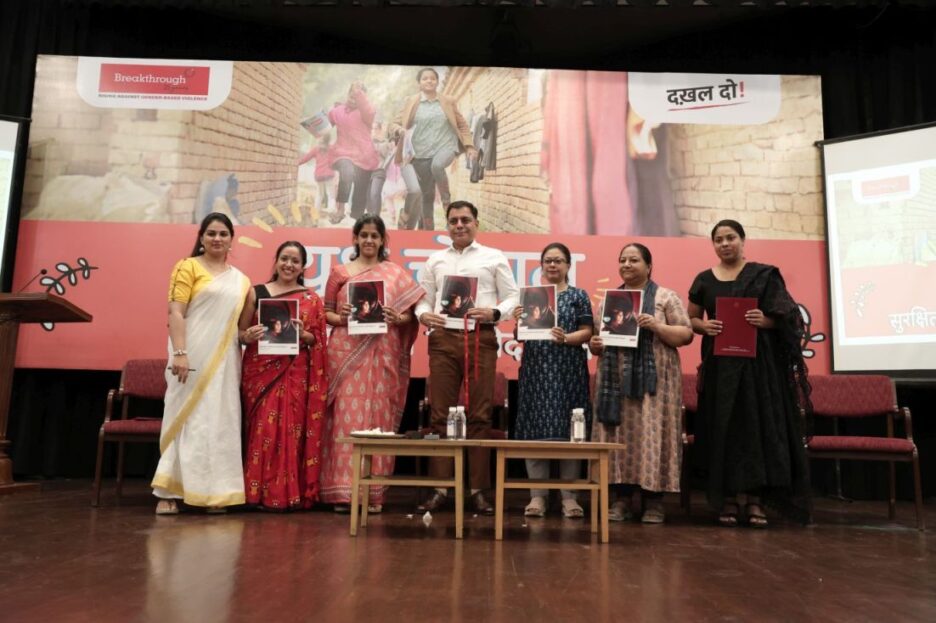Breakthrough, an organization dedicated to making gender-based violence unacceptable by transforming the culture that permits it, released the findings from its Women Safety Audit (WSA) at an event in Delhi today. Breakthrough’s Safety Audit Model identifies unsafe areas and plans for creating safer public spaces. Implemented in four communities in Delhi, the report has provided valuable insights into public safety issues affecting women and girls.
In India, violence against women is considered one of the major impediments to achieving gender equality. It not only imposes a huge economic cost on the nation but also restricts women and girls from participating in public life. Breakthrough enables a generational shift towards a gender-equal culture by promoting aspiration, leadership, agency, and negotiation skills among women and girls. Women Safety is an attempt to create safe public spaces for women and girls.
The Women Safety Audit was conducted across four locations in Delhi: Old Seemapuri, New Seemapuri, Sangam Vihar, and Durga Park/Dashrathpuri by Community Youth Led Initiative.
Sanjay Bhatia,Additional Commissioner of Police, ( Crime), Sanjay Bhatia, Delhi Police said:
“The findings through a safety audit is a welcome step to create a change. The recommendations are noteworthy and definitely must receive administration support. I would urge people to come and report, fearlessly. We are committed to taking stringent measures to ensure women safety in Delhi. I would also advise everyone to use helplines number and use them”, Additional Commissioner of Police, ( Crime), Sanjay Bhatia, Delhi Police
Nayana Chowdhury, Chief Program Officer at Breakthrough said, “The release of the Women Safety Audit (WSA) findings marks a significant step towards understanding and addressing the pervasive issue of violence against women and girls in our public spaces. The insights gathered from Delhi reveal the pressing need for improved infrastructure, better lighting, and more effective policing. But beyond these measures, we need a collective shift in our cultural attitudes towards gender equality and safety. Breakthrough remains committed to driving this change and supporting our youth in leading the way towards a future free from violence and discrimination.”
Yasmeen, Team Change Leader from New Seemapuri Area, Delhi, “This was a youth-led initiative wherein around 40 youths across 4 community areas joined the initiative. The activity gave us a fair sense of the problems facing young girls and women in these communities. We will continue to meet and engage in further consultation with the administration to identify sustainable solutions to ensure safe public spaces for women and girls. We are focussed on taking this forward and creating a massive change with the help of the administration. ”
Key Findings from the Women Safety Audit
The findings shed light on the safety concerns faced by women and girls in Delhi. This audit was carried out in collaboration with local youth to capture firsthand experiences and vulnerabilities. The findings provide a detailed analysis of the various types of violence encountered, the accessibility and functionality of existing safety measures, and that requires urgent attention.
Based on the findingscomprehensive safety measures and community engagement are recommended to address the pervasive issue of violence against women and girls in public spaces in Delhi.
Key Recommendations from the Women Safety Audit
The recommendations aim to address critical issues such as infrastructure improvements, community engagement, enhanced surveillance, and capacity building for service providers. Implementing these recommendations is essential to create a supportive environment where women and girls can feel safe.
Promotion of Zero Tolerance
To address violence against women and girls, it is essential to adopt a zero-tolerance policy. This involves prompt action by police towards incidents of violence while commuting, in public places, and even within homes. Effective law enforcement can deter potential offenders and create a safer environment.
Improved Safety Measures
Enhancing safety in public transport and infrastructure is critical. Installing panic buttons in public transport, setting up CCTV cameras, and conducting random checks during school hours can significantly improve security. These measures will help monitor and quickly respond to any incidents of harassment or violence.
Enhanced Access to Services
Improving access to quality services and making safety information readily available in public spaces and educational institutions can empower women and girls. Information on helplines, safety protocols, and support services should be prominently displayed.
Strengthen Surveillance
Improving surveillance systems in public spaces is essential. This includes installing more CCTV cameras, ensuring regular police patrolling, and setting up community surveillance programs. Enhanced street lighting, especially on approach roads, main roads, and public transport points, is also necessary.
Sensitization Programs
Organizing regular sensitization programs for local police personnel can improve their communication skills and handling of violence against women complaints. Similarly, sensitization programs for political and elected representatives can raise awareness about safety concerns and drive policy changes.
Capacity Building
Building the capacity of service providers to address violence against women is crucial. Training and development programs can equip them with the skills and knowledge needed to support victims effectively.
The findings and recommendations from the Women Safety Audit underscore the urgent need for comprehensive and collaborative efforts to enhance the safety and security of women and girls in public spaces. Addressing issues such as inadequate infrastructure, insufficient surveillance, and lack of community involvement will create a safer environment that empowers women and girls to participate fully in public life.

